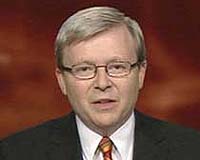 |
Washington (AFP) Nov 24, 2009 US President Barack Obama sought Tuesday to boost hopes of a landmark deal at the Copenhagen climate summit, as a new report showed the crisis facing the planet is deeper than previously thought. Obama, hosting India's leader at the White House a week after visiting top global polluter China, said recent progress meant the world was "one step closer to a successful outcome in Copenhagen." Countries must "reach a strong operational agreement that will confront the threat of climate change while serving as a stepping-stone to a legally binding treaty," he told a press conference with Prime Minister Manmohan Singh. In a joint statement, Singh and Obama spoke of their hopes for a "comprehensive" deal at the December 7-18 United Nations climate conference in Copenhagen. "It should reflect emission reduction targets of developed countries and nationally appropriate mitigation actions of developing countries," they said. The upbeat comments came shortly after scientists issued a sobering review ahead of the Copenhagen summit that said the planet could be getting much hotter, much faster than anticipated only two years ago. The 68-page report suggests that many of the estimates in a report by the UN Intergovernmental Panel on Climate Change (IPCC) in 2007 were too low. The planet may warm by 10.8 degrees Fahrenheit (seven degrees Celsius) and sea levels could rise by 3.25 feet (over a meter) by 2100, scenarios that seemed improbable just two years ago. "This is a final scientific call for climate negotiators from 192 countries who must embark on the climate protection train in Copenhagen," said Hans Schellnhuber, director of Germany's Potsdam Institute for Climate Impact Research (PIK), which oversaw the paper. "They need to know the stark truth about global warming and the unprecedented risks involved." The Copenhagen conference already received a boost on Monday when a senior Obama administration official said the United States would put on the table a near-term target for reducing its greenhouse gas emissions. The official indicated the US target -- considered fundamental to any meaningful deal being achieved -- would not differ much from levels mentioned in legislation before Congress. A House of Representatives bill, passed in June, calls for cutting greenhouse gas emissions by 17 percent from 2005 levels by 2020 and by 83 percent by 2050. A slightly more ambitious bill before the Senate, but not due to be debated again until early next year, talks of a 20 percent reduction from 2005 levels by 2020. The senior administration official also said Obama could make a last-minute decision to attend the conference if "negotiations have proceeded sufficiently that going to Copenhagen would give a final impetus, a push, to the process." But Obama still has to traverse some difficult domestic waters, with a recent Washington Post and ABC News poll showing just 54 percent of Republican voters believe that global warming is real. China has put the climate issue on the agenda of a meeting with the European Union next week and leaders of the 53 members of the Commonwealth, representing around two billion people, are set to address it at their weekend gathering in Trinidad. Australia, the world's heaviest per capita polluter, is attempting to rush legislation through parliament curbing emissions ahead of the Copenhagen talks, which aim to clinch a global treaty to replace the Kyoto Protocol before it expires in 2012. India, China and other developing nations have been pressing for Western nations to offer technology and other support to help them reduce the intensity of emissions blamed for global warming. But the emerging economies have resisted legally binding requirements, saying that wealthy nations, not them, bear the historic responsibility for carbon emissions. The European Union has vowed to reduce its emissions by 20 percent from 1990 levels before 2020, raising the target to 30 percent in the event of an international agreement. Japan has offered 25 percent, but attached conditions. In order to limit warming to two degrees Celsius (3.6 degrees Fahrenheit), a threshold widely adopted as safe, scientists say emissions by industrialized nations must fall by 25-40 percent by 2020 over 1990 levels. The United States was the world's biggest carbon emitter until it was overtaken by China in 2006, according to the Global Carbon Project, a consortium of leading climate scientists. burs-ag/arb Share This Article With Planet Earth
Related Links
 Australian PM urges parliament to approve carbon cuts
Australian PM urges parliament to approve carbon cutsCanberra (AFP) Nov 24, 2009 Australian Prime Minister Kevin Rudd urged parliament Tuesday to approve legislation aiming to slash carbon pollution by up to 25 percent by 2020 ahead of next month's global talks on climate change. Rudd said Australia had to get "real" about climate change by introducing the cap-and-trade system for greenhouse gas emissions, as the opposition coalition agonised over supporting the bill ... read more |
|
| The content herein, unless otherwise known to be public domain, are Copyright 1995-2009 - SpaceDaily. AFP and UPI Wire Stories are copyright Agence France-Presse and United Press International. ESA Portal Reports are copyright European Space Agency. All NASA sourced material is public domain. Additional copyrights may apply in whole or part to other bona fide parties. Advertising does not imply endorsement,agreement or approval of any opinions, statements or information provided by SpaceDaily on any Web page published or hosted by SpaceDaily. Privacy Statement |